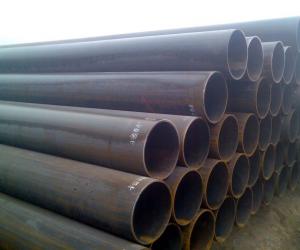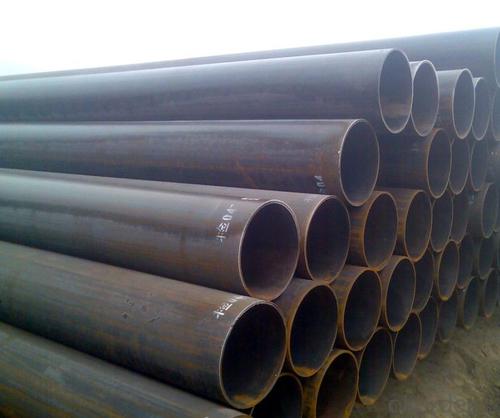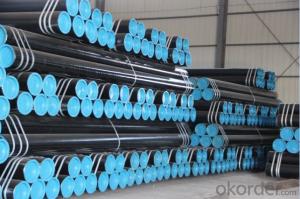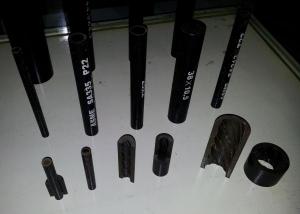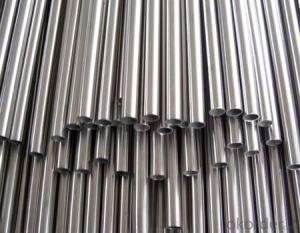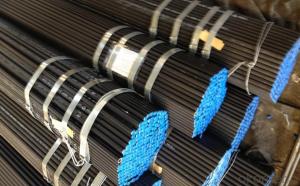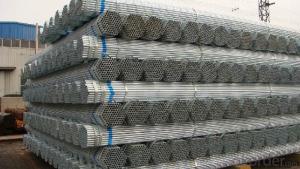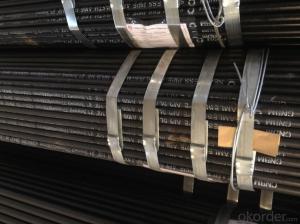Seamless Carbon Steel Pipe of API SAME SA106 Ship Buding Application
- Loading Port:
- Tianjin
- Payment Terms:
- TT OR LC
- Min Order Qty:
- 25 m.t.
- Supply Capability:
- 10000 m.t./month
OKorder Service Pledge
OKorder Financial Service
You Might Also Like
1、Structure of Seamless Carbon Steel Pipe of API SAME SA106 Ship Buding Application Description:
Seamless pipe is formed by drawing a solid billet over a piercing rod to create the hollow shell. As the manufacturing process does not include any welding, seamless pipes are perceived to be stronger and more reliable. Historically seamless pipe was regarded as withstanding pressure better than other types, and was often more easily available than welded pipe.
2、Main Features of Seamless Carbon Steel Pipe of API SAME SA106 Ship Buding Application :
• High manufacturing accuracy
• High strength
• Small inertia resistance
• Strong heat dissipation ability
• Good visual effect
• Reasonable price
3、Seamless Carbon Steel Pipe of API SAME SA106 Ship Buding Application Images:
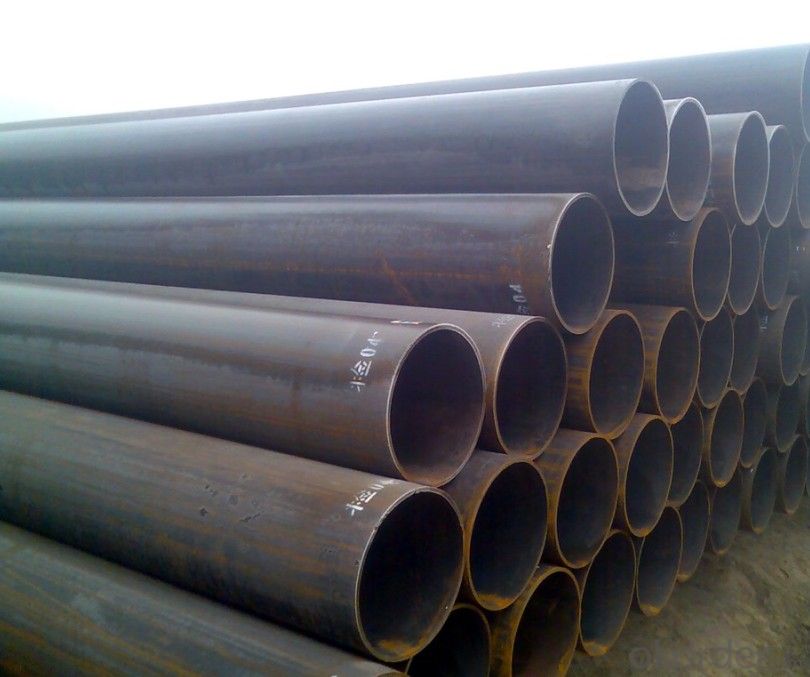
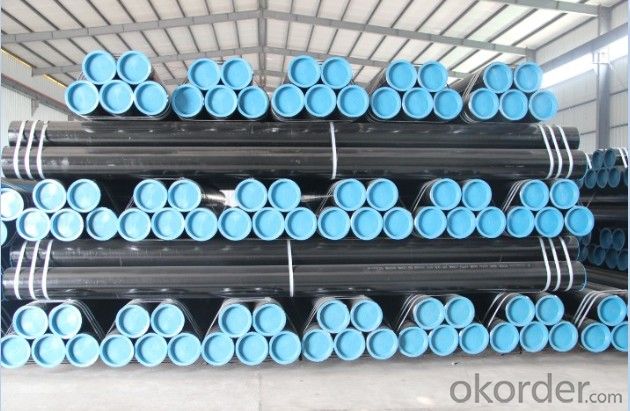
Packaging & Delivery
Packaging Details: | seaworthy package,bundles wrapped with strong steel strip |
Delivery Detail: | 15-30days after received 30%TT |
4、Seamless Carbon Steel Pipe of API SAME SA106 Ship Buding Application Specification:
Standard | GB, DIN, ASTM |
Grade | 10#-45#, 16Mn |
Thickness | 8 - 33 mm |
Section Shape | Round |
Outer Diameter | 133 - 219 mm |
Place of Origin | Shandong, China (Mainland) |
Secondary Or Not | Non-secondary |
Application | Hydraulic Pipe |
Technique | Cold Drawn |
Certification | API |
Surface Treatment | factory state or painted black |
Special Pipe | API Pipe |
Alloy Or Not | Non-alloy |
Length | 5-12M |
Outer Diameter | 21.3-610mm |
Grade | 20#, 45#, Q345, API J55, API K55, API L80, API N80, API P110, A53B |
Standard | ASME, ASTM |
1.Material:20#(ASTM A 106/A53 GRB.API5LGRB,GB),45#,16Mn,10#.
2.Specification range:OD:21.3-610mm,WT:6-70mm,length:6-12m or according to the requirement of clients.
3.Excutive standards:GB,ASME API5L.ASTM A 106/A53,Despite of the above standards,we can also supply seamless steel pipe with standard of DIN,JIS,and so on,and also develop new products according to the requirements of our clients!
4.Surface:black lacquered,varnish coating or galvanized.
5.Ends:Beveled or square cut,plastic capped,painted.
6.Packing:bundles wrapped with strong steel strip,seaworthy packing.
5、FAQ OF Seamless Carbon Steel Pipe of API SAME SA106 Ship Buding Application:
①How is the quality of your products?
Our products are manufactured strictly according to national and internaional standard, and we take a test
on every pipe before delivered out. If you want see our quality certifications and all kinds of testing report, please just ask us for it.
Guaranteed: If products’ quality don’t accord to discription as we give or the promise before you place order, we promise 100% refund.
②How about price?
Yes, we are factory and be able to give you lowest price below market one, and we have a policy that “ for saving time and absolutely honest business attitude, we quote as lowest as possible for any customer, and discount can be given according to quantity”,if you like bargain and factory price is not low enough as you think, just don’t waste your time.Please trust the quotation we would give you, it is professional one.
③Why should you chose us?
Chose happens because of quality, then price, We can give you both.Additionally, we can also offer professional products inquiry, products knowledge train(for agents), smooth goods delivery, exellent customer solution proposals.Our service formula: good quality+good price+good service=customer’s trust
SGS test is available, customer inspection before shipping is welcome, third party inspection is no problem.
Any question, pls feel free to contact us !
- Q: Can steel pipes be used for underground water lines?
- Yes, steel pipes can be used for underground water lines.
- Q: How do you connect steel pipes together?
- To connect steel pipes together, there are several methods commonly used in various industries. One commonly used method is welding. Welding involves heating the ends of the steel pipes and then joining them together using a welding rod or wire. This method creates a strong and durable connection that is capable of withstanding high pressures and temperatures. Another method is threading, where threads are cut into the ends of the steel pipes. These threaded ends can then be screwed together using pipe fittings such as couplings or unions. Threading is commonly used for smaller diameter pipes and is advantageous as it allows for easy disassembly and reassembly of the pipes. Flanges can also be used to connect steel pipes together. Flanges are flat, circular discs with holes in them that can be bolted together. They provide a strong and secure connection, especially for large diameter pipes or pipes that need to be easily disconnected for maintenance or repairs. Pipe fittings such as couplings, tees, elbows, or reducers can also be used to connect steel pipes together. These fittings are typically made of steel or other materials and are designed to be welded, threaded, or connected using other methods like grooving or compression. It's important to note that the method used to connect steel pipes together will depend on various factors such as the pipe size, the application, the required strength, and the specific industry standards or codes that need to be followed. Therefore, it's essential to consult with a qualified professional or refer to industry-specific guidelines when choosing the appropriate method for joining steel pipes.
- Q: Can steel pipes be used for underground oil and gas pipelines?
- Yes, steel pipes can be used for underground oil and gas pipelines. Steel is a widely used material in the oil and gas industry due to its strength, durability, and resistance to corrosion. Steel pipes are capable of withstanding the high pressure and extreme conditions often encountered in underground pipelines, making them a reliable choice for transporting oil and gas.
- Q: What are the applications of steel pipes in the automotive industry?
- Steel pipes are commonly used in the automotive industry for various applications such as exhaust systems, fuel lines, and structural components. They offer excellent durability, corrosion resistance, and high tensile strength, making them ideal for carrying fluids and withstanding harsh environments. Additionally, steel pipes can be easily formed and welded, allowing for efficient manufacturing and assembly processes in the automotive sector.
- Q: Can steel pipes be used for stormwater management systems?
- Yes, steel pipes can be used for stormwater management systems. Steel pipes are commonly used in stormwater management systems for their durability, strength, and resistance to corrosion. They can efficiently transport stormwater runoff, helping to manage and control its flow. Additionally, steel pipes can be customized to meet specific project requirements, making them a versatile choice for stormwater management systems.
- Q: How are steel pipes repaired in case of damage or leaks?
- Steel pipes can be repaired in case of damage or leaks through various methods. One common approach is to use a process called welding. Welding involves melting a filler material together with the damaged or leaking area of the pipe, creating a strong bond that seals the leak. This method is effective for small to moderate-sized leaks and is widely used in industries such as oil and gas, plumbing, and construction. Another method is to use mechanical couplings. These couplings are designed to join two sections of pipe together, providing a tight and secure connection. They can be used to repair damaged or leaking sections of a steel pipe by cutting out the damaged area and replacing it with a new section, which is then connected using the mechanical coupling. This method is particularly useful for larger leaks or damaged sections that cannot be repaired through welding. In some cases, a temporary fix may be applied using pipe clamps or epoxy compounds. Pipe clamps are used to tightly seal the damaged area, preventing further leakage. Epoxy compounds, on the other hand, are applied directly to the damaged or leaking area, creating a seal that temporarily stops the leak until a more permanent repair can be made. It is important to note that the method of repair will depend on the severity and location of the damage or leak, as well as the specific requirements of the application. In some instances, it may be necessary to replace the entire section of the steel pipe if the damage is extensive or if multiple leaks are present. Consulting with a professional or a specialized pipe repair service is recommended to determine the most appropriate repair method for a specific situation.
- Q: Can steel pipes be used for underground gas pipelines?
- Yes, steel pipes can be used for underground gas pipelines. Steel pipes are commonly used in the construction of gas pipelines due to their strength, durability, and resistance to corrosion. They provide a reliable and safe means of transporting gas underground.
- Q: How are steel pipes insulated to prevent condensation?
- Steel pipes are typically insulated using materials such as foam or fiberglass wraps, which act as a barrier between the cold pipe surface and the surrounding air. This insulation prevents the formation of condensation by reducing heat transfer and maintaining the pipe temperature above the dew point of the air.
- Q: Are steel pipes resistant to chemicals and corrosion?
- Yes, steel pipes are generally resistant to chemicals and corrosion. Steel pipes are often coated with protective layers such as zinc or epoxy to enhance their resistance to corrosion. These coatings act as a barrier, preventing chemicals from coming into direct contact with the steel and reducing the risk of corrosion. Additionally, steel itself has inherent corrosion-resistant properties, making it a suitable material for many applications where exposure to chemicals and corrosive elements is common. However, it is important to note that the level of resistance may vary depending on the specific type of steel, the coating used, and the specific chemicals or corrosive substances involved. Therefore, it is advisable to consult with experts and consider the specific requirements of the intended application to ensure the appropriate choice of steel and protective measures are taken to maximize resistance to chemicals and corrosion.
- Q: DN150 welded steel tubes one meter multiple
- DN150 welded steel pipe according to the thickness of two specifications: outer diameter 165mm, wall thickness 4.5mm, 17.81Kg per meter weight, wall thickness of 5.5mm, 21.63Kg. per meter weight
Send your message to us
Seamless Carbon Steel Pipe of API SAME SA106 Ship Buding Application
- Loading Port:
- Tianjin
- Payment Terms:
- TT OR LC
- Min Order Qty:
- 25 m.t.
- Supply Capability:
- 10000 m.t./month
OKorder Service Pledge
OKorder Financial Service
Similar products
Hot products
Hot Searches
Related keywords
